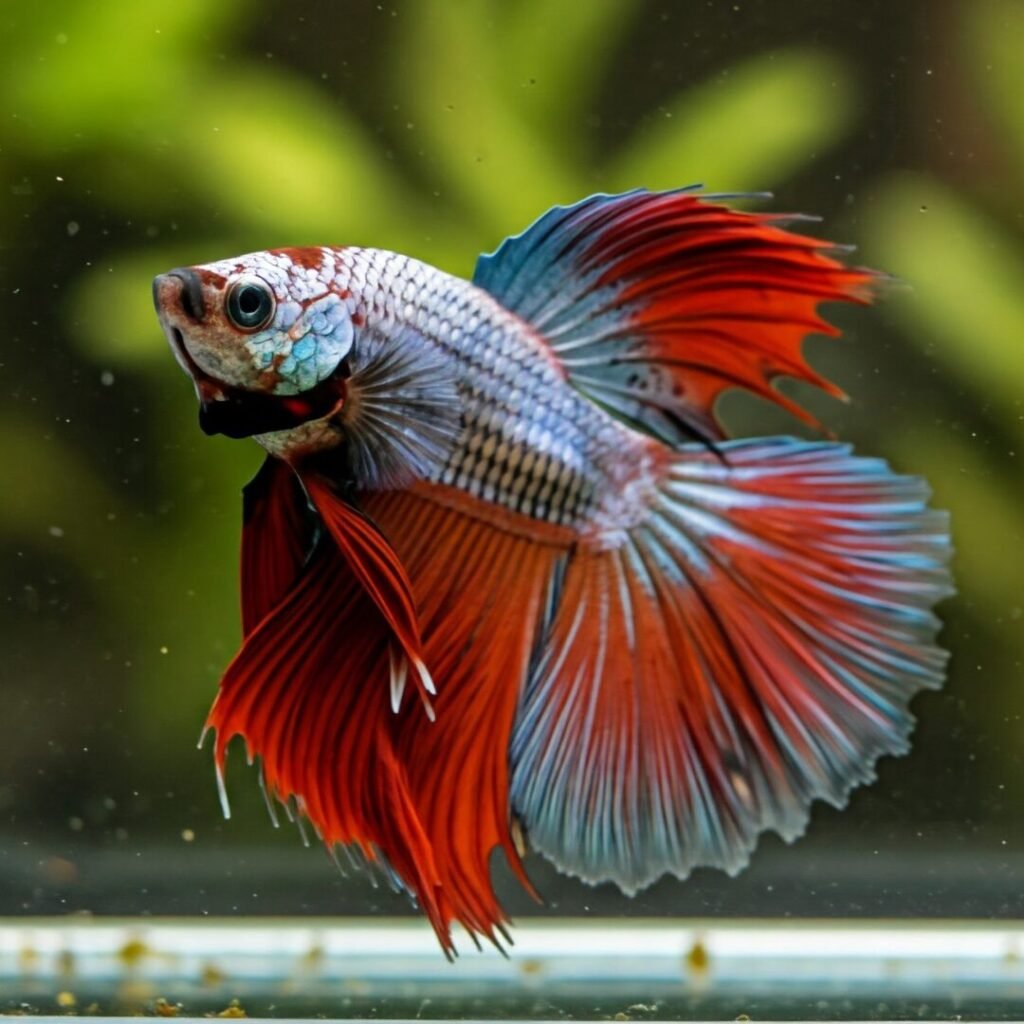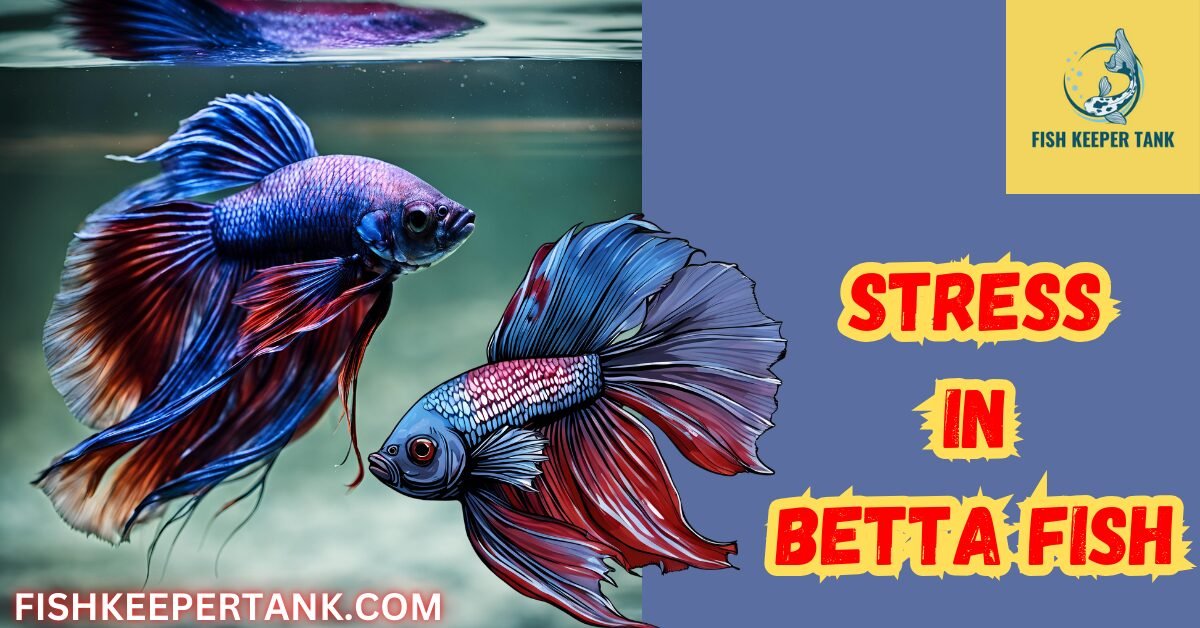Introduction
Betta fish, also known as Siamese fighting fish, are among the most popular aquarium pets due to their striking colors and engaging personalities. However, like all living creatures, they are susceptible to stress, which can significantly impact their health and lifespan. This article: “Stress in Betta Fish: Causes, Signs, and Effective Solutions” will help you understand the causes of stress in betta fish, recognizing the signs, and implementing effective solutions are crucial for ensuring a happy and healthy betta.
Key Takeaways
- Betta fish stress is a common issue that can lead to severe health problems if left unaddressed.
- Common stressors include poor water quality, overcrowding, inappropriate tank mates, and improper tank conditions.
- Signs of stress include color fading, clamped fins, erratic swimming, and lethargy.
- Reducing stress involves maintaining a clean tank, providing proper nutrition, and ensuring a stable environment.
- Preventative measures can help ensure a long and healthy life for your betta fish.

Betta Fish Habitat
In The Wild:
In their natural environment, betta fish inhabit slow-moving, warm waters such as rice paddies, swamps, and shallow streams in Southeast Asia. These habitats are rich in vegetation, providing ample hiding spots and stable water conditions, which are crucial for their well-being.
In Captivity:
Betta fish in captivity require a carefully maintained tank that mimics their natural habitat. A tank of at least 5 gallons, with proper filtration, heating, and hiding spots, is essential for reducing stress and promoting a healthy environment.
Understanding Stress in Betta Fish
Stress in betta fish arises when they encounter unfavorable conditions that affect their well-being. Prolonged stress weakens their immune system, making them more susceptible to diseases.
Causes of Stress in Betta Fish
1. Poor Water Quality
Toxic substances like ammonia, nitrites, and nitrates can build up in an unfiltered or poorly maintained tank, leading to stress and illness. Betta Fish New Tank Syndrome
2. Overcrowding
Betta fish are solitary and territorial. Keeping multiple bettas in the same tank, especially males can result in aggression and chronic stress.
3. Inappropriate Tank Mates
Not all fish make good companions for bettas. Aggressive or fin-nipping species can harass bettas, causing them continuous stress. Can Betta Fish Live with Other Fish?
4. Poor Diet
A diet lacking essential nutrients can weaken a betta’s immune system. Feeding low-quality food or overfeeding can cause digestive problems and stress. How Long Can Betta Fish Go Without Food?
5. Improper Tank Setup
A tank without adequate filtration, heating, or hiding spots can create an uncomfortable environment. Bettas thrive in stable water temperatures between 76-82°F (24-28°C). Betta Fish Water Temperature: The Essential Guide
6. Bright Lights
Bettas prefer dim lighting, similar to their natural habitat. Excessively bright lights can make them feel exposed and anxious. Do Betta Fish Need Light?
7. Sudden Changes in The Environment
Frequent water parameter fluctuations or sudden tank rearrangements can overwhelm a betta, leading to stress.
8. Lack of Hiding Spots
Hiding places, such as plants and caves, provide security. Without them, bettas may feel exposed and anxious. Java Fern Guide For Betta Fish Tank. Marimo Moss Ball In Betta Fish Tank.
9. Inadequate Stimulation
A lack of environmental enrichment, such as floating plants or decorations, can result in boredom and stress.
10. Handling and Netting
Frequent handling or improper netting can be traumatic for bettas. Handling should be minimal and done carefully.
11. Injury or Illness
Sick or injured bettas experience stress while trying to recover. Common illnesses include fin rot, ich, velvet, and swim bladder disorder. How To Treat a Sick Betta Fish? Betta Fish Diseases and Treatment
Signs of Stress in Betta Fish
Physical Signs
- Faded or dull coloration
- Clamped fins (fins held close to the body)
- Torn or frayed fins
- Rapid breathing or gasping at the surface
- Bloated or swollen belly
Behavioral Signs
- Lethargy or excessive hiding
- Erratic swimming patterns
- Glass surfing (swimming along the tank walls repeatedly)
- Loss of appetite How Long Can Betta Fish Go Without Food?
- Increased aggression or skittish behavior
How to Reduce Stress in Betta Fish?
1. Maintain Optimal Water Quality
Regular water changes and the use of a water testing kit help maintain a healthy environment. Keeping ammonia and nitrite levels at 0 ppm and nitrates below 20 ppm is crucial.
2. Provide a Comfortable Tank Environment
Ensure the tank is at least 5 gallons with proper filtration, heating, and hiding spots.
3. Adjust the Lighting
Use dim lighting or floating plants to diffuse bright lights. Keeping a consistent day-night cycle helps bettas feel secure. Do Betta Fish Need Light?
4. Add a Gentle Filter
A filter helps maintain water quality without creating strong currents that stress bettas. Do Betta Fish Need A Filter To Survive?
5. Offer a Balanced Diet
Feed high-quality betta pellets and occasional live or frozen foods like bloodworms and daphnia. Avoid overfeeding to prevent digestive issues. How Long Can Betta Fish Go Without Food?
6. Minimize Stressors
Avoid sudden movements, loud noises, and unnecessary tank rearrangements.
7. Provide Stimulation
Introduce betta-friendly decorations, mirrors for exercise (sparingly), and live plants to keep your betta engaged.
8. Use Aquarium Salt (Sparingly)
Adding a small amount of aquarium salt can help reduce stress and prevent infections.
9. Use Medications When Necessary
If your betta shows signs of disease, use appropriate medications like anti-parasitic or antibacterial treatments.

Preventing Stress in Betta Fish
Preventing stress is easier than treating a stressed betta.
- Maintaining clean water.
- Providing proper care.
- Monitoring health regularly.
What Are Betta Fish Stress Stripes?
Stress stripes are horizontal dark lines that appear on a betta’s body due to extreme stress. These stripes usually fade once the stressor is removed.
Conclusion
Stress in betta fish is a serious issue that can lead to illness and a shortened lifespan. By understanding the causes, recognizing the signs, and implementing effective solutions, you can ensure your betta lives a long and happy life. Regular tank maintenance, proper nutrition, and a well-designed habitat are essential for a stress-free betta. Remember: “A Healthy Betta Is A Happy Betta.”
Frequently Asked Questions
How do I know if my betta fish is stressed?
Look for signs like faded color, lethargy, loss of appetite, and erratic swimming.
Can stress kill a betta fish?
Yes, prolonged stress weakens the immune system and can lead to fatal diseases.
How can I calm a stressed betta fish?
Maintain clean water, provide hiding spots, and avoid sudden changes.
Do betta fish need a filter?
Yes, a gentle filter helps maintain stable water conditions.
Can stress stripes on bettas go away?
Yes, once the stressor is removed, stress stripes usually fade.
Can stress kill a betta fish?
Yes, chronic stress can weaken the immune system, making bettas more susceptible to diseases that can ultimately lead to death.
How do you know if your betta fish is happy?
Happy bettas exhibit vibrant colors, active swimming patterns, a healthy appetite, and an overall sense of well-being.
Can I put two betta fish in the same tank?
Generally, it is not recommended to house two male bettas in the same tank due to their aggressive nature. However, some bettas may tolerate certain tank mates, such as peaceful community fish.
How Often Should I Feed My Betta Fish?
Learn the ideal feeding schedule to keep your betta fish healthy and happy.
What Is the Ideal Temperature for a Betta Fish Tank?
Discover the perfect water temperature to ensure your betta thrives in its environment.
What Other Fish Can I Safely Keep with My Betta?
Find out which tank mates are compatible with betta fish to avoid conflicts.
What Type of Filtration System Is Best for a Betta Tank?
Explore the best filtration options to maintain a clean and safe habitat for your betta.
Is It Possible to Breed Betta Fish in Captivity
Get insights into the process and challenges of breeding betta fish at home.
Can Stress in Betta Fish Be Fatal?
Understand how stress impacts betta fish and whether it can lead to serious health issues.
Can Betta Fish Experience Stress from Being Alone?
Learn whether betta fish feel lonely and how their social needs affect their well-being.
How Long Does a Stressed-Out Betta Fish Need to Recover?
Find out the recovery timeline for a stressed betta and how to help them bounce back.
How can I tell if my betta fish is stressed?
Look for physical signs like faded colors, clamped fins, or rapid gill movement. Behavioral signs include lethargy, loss of appetite, and excessive hiding.
Can betta fish recover from stress?
Yes, with proper care and a stress-free environment, betta fish can recover from stress. Address the underlying causes and monitor their progress.
How often should I change the water in my betta’s tank?
Perform a 25-30% water change weekly to maintain clean and healthy water conditions.
Can betta fish live with other fish?
Betta fish are solitary and prefer to live alone. If you choose to add tank mates, ensure they are peaceful and compatible with bettas.
What is the ideal tank size for a betta fish?
A minimum of 5 gallons is recommended to provide enough space for swimming and exploration.
People Also Read:
| Marimo Moss Ball In Betta Fish Tank |
| How To Treat a Sick Betta Fish? Betta Fish Diseases and Treatment |
| Can Betta Eat Tropical Fish Food? |
Betta Fish Swimming In Circles: Erratic Swimming Behavior In Betta Fish
Betta Fish Turning White
Do Betta Fish Need Sunlight?
| Can Betta Fish Live with Other Fish? |
| Do Betta Fish Need A Filter To Survive? |
| How Long Can Betta Fish Go Without Food? |

